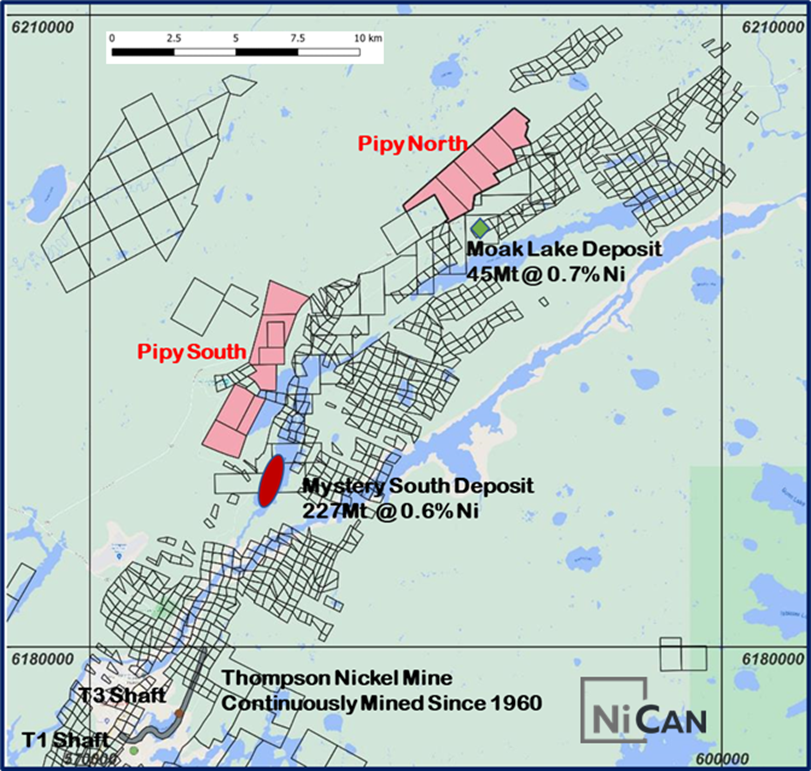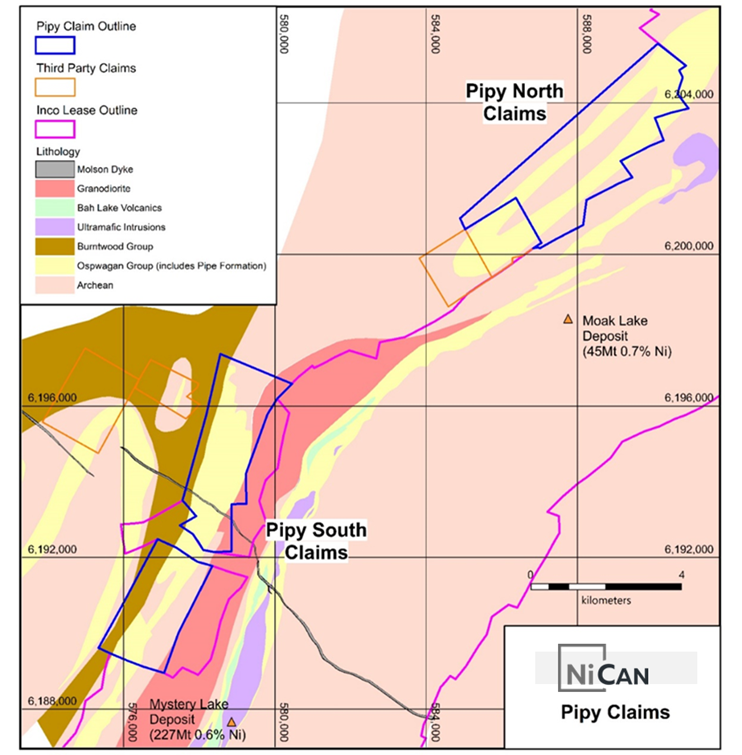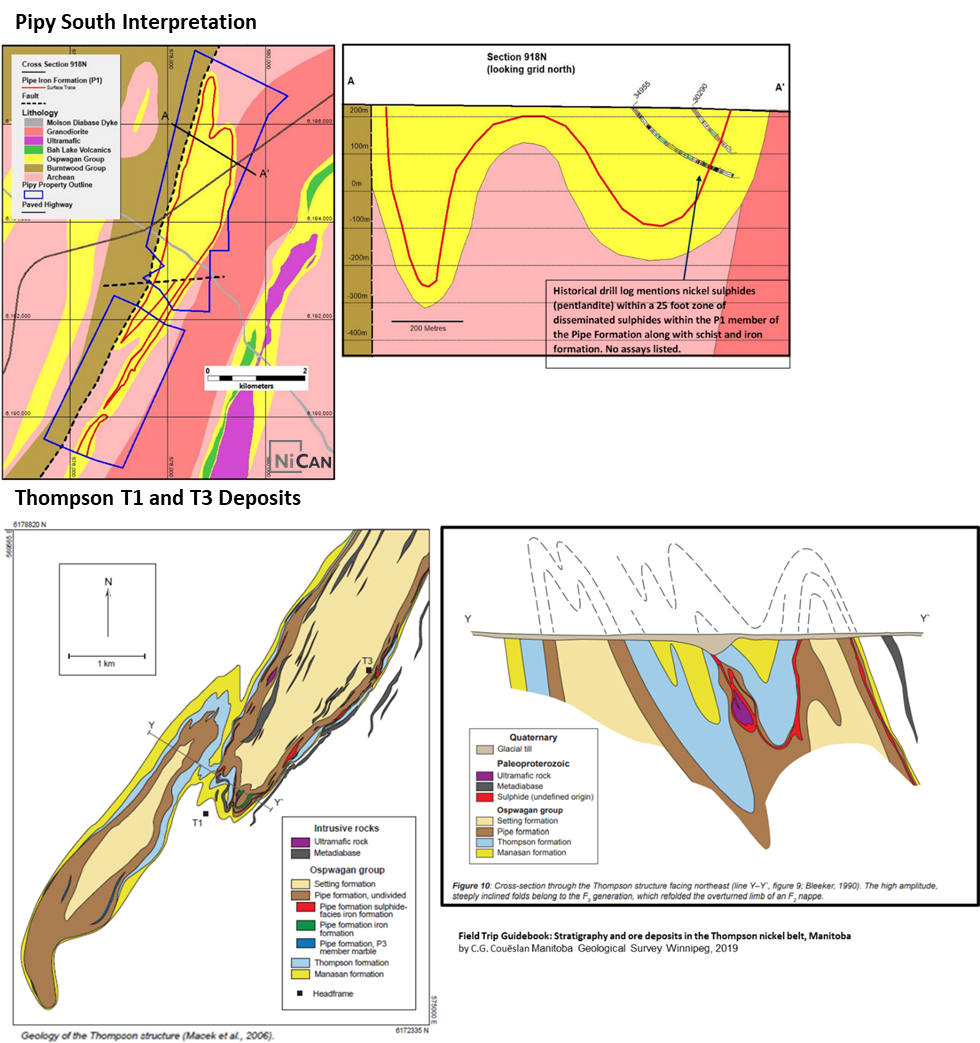Toronto, Ontario – September 6, 2022 – NiCAN Limited (“NiCAN” or the “Company”) (TSX-V:NICN) has expanded its land position at its Pipy Project (“Pipy”) along the Thompson Nickel Belt, now totaling over 24 km2 of prospective ground (Figure 1). The new claims, known as Pipy North, cover an area of 11.84 km2, and are contiguous with Vale’s property to the south.
Highlights:
- Doubled land position at the Pipy project, now totaling over 24 km2
- Targeting high grade nickel sulphide mineralization similar to the Thompson T1 and T3 mines
- Initial work plan includes airborne electromagnetic survey followed by a diamond drilling program
- Prospective Pipe Formation on Pipy South has been defined via historical drilling and recently completed airborne magnetic surveys
Figure 1: NiCAN’s Land Position at the Pipy Project in Thompson Manitoba

The newly acquired Pipy North claims are interpreted to be underlain by the Pipe Formation, confirmed by available aeromagnetic and government geological mapping. The Pipe Formation is known to host all the nickel deposits in the Thompson area. A folded anticlinal structure is interpreted along with iron formation of the Pipe Formation and associated ultramafic rocks. Pipy North is along strike from Pipy South (Figure 2) and sits in the same structural stratigraphic position as Vale’s formerly producing Birchtree Mine, 18 km to the southwest along strike.
Figure 2: Geological Structure of the Pipy Land Package

Pipy South Claim Group
The two Pipy South claim areas cover 13 km2 and are 12 km north of the Thompson Mine and adjacent to the Mystery Lake South ultramafic hosted deposit. The property is underlain by an 8 km long synclinal structure exposing Ospwagan Group sediments including the critical Pipe Formation that host the nickel deposits in the Thompson Nickel Belt.
The recently acquired high-resolution UAV airborne magnetic survey was instrumental in interpreting the geology and a new structural model was developed from the three-dimensional inverted magnetic data. The magnetic data revealed the syncline comprised of two synclines on the east and west edges with an anticline in the middle. The various fold closures associated with the synclines and anticlines are an ideal location to structurally concentrate massive sulphides (Figure 3).
Figure 3: Similar Stratigraphy and Structural Setting to the Thompson Deposit – Pipy South vs Thompson T1 and T3 Deposits

Pipy South was explored in the late 1950s, through the early 1970s. There are 71 historical drill holes, 48 of which were drilled by INCO Limited (“INCO”) in 1967 and 1968. Much of the early drilling was shallow and appears to be testing conductors. The assessment files only contain summary logs for the 1967 INCO drilling with more detailed logs for 9 of the 12 drill holes drilled in 1968. Importantly, six drill holes mention significant intervals of disseminated sulphides, including short intervals of massive sulphides or sulphide breccia and three drill holes mention pentlandite. Several drill holes intersected intervals of ultramafic rock. None of the INCO drill logs included any assay information.
The Company has identified several drill targets as a result of the historical drilling data and the new structural model of Pipy South.
Pipy North Claim Group
The newly acquired ground covers an area of 11.84 km2 of stratigraphy over a folded strike length of 6 km similar to that which hosts the world-class Thompson T1 and T3 deposits located 28 km to the southwest. Historical drilling of 1,720 metres in nine drill holes by INCO in 1967 and 1968 and one drill hole by Falconbridge Limited in 2001 intersected Pipe Formation sulphide iron formation and ultramafic intrusions, the key ingredients for nickel deposit formation in the Thompson Nickel Belt.
Three of the INCO drill holes cut significant lengths of ultramafic rocks from 50 metres to 100 metres in core length. The INCO drill logs are summary logs, which do not provide detailed descriptions of lithology, mineralization, or assay data. The area has been flown by airborne geophysical surveys, both magnetic and electromagnetic, also covered locally by HLEM ground geophysics.
The historical geophysical testing systems were not as powerful as the technology available today and predate recent advances in 3D modelling and inversions. NiCAN intends to leverage all the advantages of recent geophysical systems, 3D modelling software, in house expertise, and recent research on the Thompson Nickel Belt to model a comprehensive structural and geological representation to guide future drilling.
Qualified Person
Mr. Stan Clemmer, P.Geo, a consultant to NiCAN, who is a qualified person under National Instrument 43-101 – Standards of Disclosure of Mineral Projects (“NI 43-101”) has reviewed and approved the scientific and technical information in this press release.
About NiCAN
NiCAN Limited is a mineral exploration company, trading under the symbol “NICN” on the TSX-V. The Company is actively exploring two nickel projects, both located in well-established mining jurisdictions in Manitoba, Canada.
Contact Information:
Brad Humphrey Sandy Noyes
President and CEO Investor Relations & Communications
416.565.4007 snoyes@NiCANLtd.com
info@NiCANLtd.com
To receive news releases by e-mail, please register using the NiCAN website at www.nicanltd.com.
Cautionary Note Regarding Forward-Looking Statements
The information contained herein contains certain “forward-looking information” under applicable securities laws concerning the proposed financing, business, operations and financial performance and condition of NiCAN Limited. Forward-looking information includes, but is not limited to, the size and timing of the drill program, results of the drill program, NiCAN’s ability to identify mineralization similar to that found in prior drill holes, the benefits and the potential of the properties of the Company; future commodity prices (including in relation to NiEq calculations); drilling and other exploration potential; costs; and permitting. Forward-looking information may be characterized by words such as “plan,” “expect,” “project,” “intend,” “believe,” “anticipate”, “estimate” and other similar words, or statements that certain events or conditions “may” or “will” occur. Forward-looking information is based on the opinions and estimates of management at the date the statements are made and are based on a number of assumptions and subject to a variety of risks and uncertainties and other factors that could cause actual events or results to differ materially from those projected in the forward-looking information. Many of these assumptions are based on factors and events that are not within the control of the Company and there is no assurance they will prove to be correct. Factors that could cause actual results to vary materially from results anticipated by such forward-looking information includes changes in market conditions, fluctuating metal prices and currency exchange rates, the possibility of project cost overruns or unanticipated costs and expenses and permitting disputes and/or delays. Although the Company has attempted to identify important factors that could cause actual actions, events or results to differ materially from those described in forward-looking information, there may be other factors that cause actions, events or results not to be anticipated, estimated or intended. There can be no assurance that forward-looking information will prove to be accurate, as actual results and future events could differ materially from those anticipated in such statements. The Company undertakes no obligation to update forward-looking information if circumstances or management’s estimates or opinions should change except as required by applicable securities laws. The reader is cautioned not to place undue reliance on forward-looking information.
Neither TSX-V nor its Regulation Services Provider (as that term is defined in policies of the TSX-V) accepts responsibility for the adequacy or accuracy of this release.
